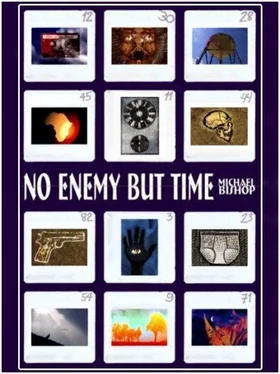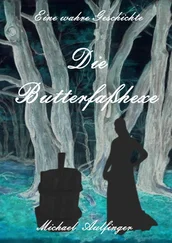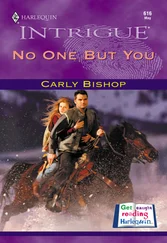Eight miles away, over a rolling stretch of prairie dotted with cottonwoods, lay Udall, Kansas. The blacktop from Wichita, Highway 15, cut a clean diagonal toward that almost mythical little town. During Jeannette’s senior year in high school, nine years ago, a tornado had completely flattened Udall, killing more than sixty people and distributing kaboodles of outlandish debris all over the countryside.
As they walked into the open field, Jeannette told John-John the story. She embellished the account with colorful details. The farmer who had described the twister as sounding like a thousand jets and looking like a big oil slush. The telephone operator who had died at her switchboard. The man who had been thrown up a tree alive. John-John, his mother noted, appeared to be hanging on every word, as if she were promulgating some obvious but deliciously entertaining lie. Too, the rhythms of her voice had seduced him.
“Today that town looks one-hundred-percent, brand-spanking new,” she concluded. “You’d never know it had once been wiped off the map as surely as Neanderthals and woolly mammoths.”
They stood in the autumn turkey grass together, silent again. A meadowlark flew up from the ground cover, inscribed a parabola on the pale October sky. Jeannette began to feel vulnerable, exposed, as if their uprightness in this place invited either ridicule from the conventional folks in the houses behind them or attack from the cavemen and pachyderms hidden in the bushes beyond the arroyo dividing this small expanse of cow pasture. Crazy thoughts, but the wind was blowing and the world seemed big and hostile.
Now that her tornado story was over, John-John’s interest shifted elsewhere. He took off downhill, toward the gully. He was fast, too. To keep her dress out of the snagging thistles and shrub branches, she grabbed it up by the hem, then plunged down the meadow after him. By seizing his wrist, she halted his single-minded assault on the dry flood bed. The boy strained against her grip. He pointed and made unintelligible noises in his throat.
Phrygian, Hugo facetiously called these vocalizations. We’ve got a kid who speaks Phrygian. That, according to a friend of his in the library at McConnell, had once been thought the first language ever spoken by human beings.
Beyond the arroyo were five or six white-faced heifers placidly chewing their cuds. Despite their bulk, Jeannette had not seen them until just now. Like rhinoceroses or giraffes, they were browsing on the shrubbery that had partly concealed them, stripping the year’s last leaves from their branches. It was weird, this sudden apparition of cattle. Even weirder that they were browsing rather than cropping grass.
It almost seemed that John-John had summoned them into existence by pointing at them.
“Cows,” Jeannette said distractedly. “Cows.”
“ Cao,” John-John said, still pointing.
Startled, Jeannette knelt in front of the boy and gripped his shoulders so that she was blocking his view.
“That’s right,” she said eagerly. “That’s right— cow ! The word is cow !”
He pulled to the right, not interested in his mother’s efforts to reinforce his accomplishment.
Brushing a strand of wayward hair from her face, Jeannette stood up. Let him see the goddamn cows, for God’s sake! She felt lighthearted and proud. Phrygian, hell! Cao was English, no matter how broadly inflected. A good Anglo-Saxon English word. By uttering this single word he had vindicated her faith in his potential. Even though many children did not speak until well after their second birthday, that “feral child” business of Major so-and-so in Colonel Unger’s office had bugged her for better than a year. She had secretly begun to suspect that John-John’s unmonitored infancy in Seville had taken an insidious toll on his capacity to pick up language. This suspicion, in turn, had riddled her with guilt, because otherwise he was an alert and vivacious child.
“Cow,” she said, laughing. “ Cao, cao, cao.”
* * *
“I don’t believe it, mujer .”
“It’s true—he spoke.”
“To a herd of cows?”
“Not to them, Hugo. He just saw them and he—”
“He said cow , Daddy!”
They were sitting in the kitchen at a table with a Formica top, part of the dinette set that Hugo had bought last Christmas through the McConnell Base Exchange. John-John was in an aluminum high chair with a yellow plastic tray. With a spoon in his right hand and the greasy fingers of his left, he was eating overdone hamburger granules. His mouth was smeared with mustard.
Hugo addressed Anna with mock stateliness: “‘Four score and seven years ago,’ John-John told the cows, ‘our fathers brought forth on this continent a new nación , conceived in libertad and dedicated to—’ How does the rest of it go, niña ?”
“Daddy!”
“He really did speak,” Jeannette insisted. “Not Phrygian, either.”
“Then I think we should be havin’ steak instead of hamburger.” Hugo lifted a piece of hamburger patty on his fork tines. “John-John, this is cao , too. You see this? You’re eatin’ cao , Juanito, all the time eatin’ those big sleepy creatures with those big brown eyes. Say cao for me, pretty please.”
The boy, scattering bits of hamburger on the linoleum, pointed in the direction that Jeannette had taken him on his walk that morning. Toward the elementary school. Toward Udall.
“And at the playground a little boy named Donnie told me I ought to read to John-John—not just alphabet and picture books. Real books, difficult things. I’m going to start doing that, too.”
“When?” Hugo asked warily.
“Right after his bath. Why don’t you and Anna get the dishes?”
“Why don’ I wear high heels and lipstick?” Hugo retorted. But he and Anna did what Jeannette had asked.
Jeannette, meanwhile, supervised John-John’s bath, diapered him, shoehorned him into his terrycloth pajamas, and stood him up in his crib. He folded his arms over the crib’s top railing and watched his mother jockey a rocking chair into place beside him. Although he was old enough to climb out of the crib, Jeannette had taught him that doing so at bedtime would cost him. Two or three evenings a week he made a break for it, anyway.
Tonight, however, Jeannette’s continued presence in his and Anna’s room kept this impulse in check. As his mother removed a garish paperback from the pocket of her sunflower-print apron, he looked on with mounting curiosity. Then Jeannette sat down in the rocking chair and opened the book and began to read: “‘ When Mr. Bilbo Baggins of Bag End announced that he would shortly be celebrating his eleventy-first birthday with a party of special magnificence, there was much talk and excitement in Hobbiton …’”
Fruit of the Looms
Ourcontingency plan demanded that I be present at lakeside every sunrise and sunset for the possible extrusion of the Backstep Scaffold, a stipulation that cut down my range and frustrated my efforts to observe Helen’s people. This demand was doubly difficult to observe because the scaffold did not appear. Nevertheless, after missing my first sunrise assignation, for the entire week afterward I honored my end of the bargain and showed up at lakeside even when irritably certain that my colleagues in the twentieth century would fail me again. Still, I did not believe I was permanently stranded. Kaprow and his assistants were experiencing Technological Difficulties, bugs that they would undoubtedly overcome in time, and time was Kaprow’s private bailiwick.
Читать дальше



![Ally Carter - [Gallagher Girls 01] I'd Tell You I Love You But Then I'd Have to Kill You](/books/262179/ally-carter-gallagher-girls-01-i-d-tell-you-i-lo-thumb.webp)








